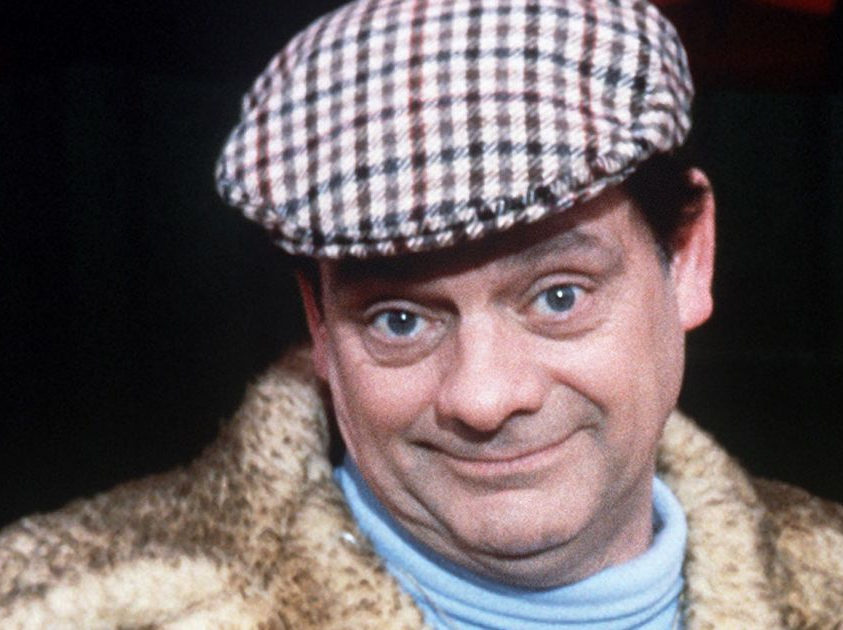A sitcom character could be many things. They could be short or tall, charming or repulsive, industrious or lazy. They might work as a copper or a priest or a shop owner. They might live in an ordinary house or languish in a prison.
Whatever attributes they could have, there’s something every sitcom character has in common: a comic flaw. In every episode, our loveable (or detestable) protagonist sets out to achieve something only to have their plans scuppered. And the defining thing about sitcom is that it’s usually the protagonist themselves who throws a spanner into the works.
In this article, I’m going to put some meat on the conceptual bone by exploring one character’s comic flaw in particular. And what better choice than the lead character of the series that was once chosen as Britain’s Best Sitcom?
Derek ‘Del Boy’ Trotter is the main protagonist from Only Fools and Horses, which originally ran for over two decades from 1981 – 2003. He’s almost the prototype loveable loser, optimistic and self-assured despite his situation. He works as a market trader and lives in a grotty London tower block, but has ambitions that border on delusions of grandeur. He views himself as a high-powered businessman and constantly declares that he’s on the verge of becoming a millionaire, despite spending his days flogging low-quality tat that’s either bankrupt stock or outright ‘hooky’ (i.e. stolen).
Viewers love watching Del for a variety of reasons, most of which come down to his being a dishonest rascal. He cheats people endlessly just to make a few quid. He lies compulsively either to avoid trouble or to impress those around him. He covers himself in garish jewellery and attempts to show off by uttering nonsensical French phrases. In short, he’s selfish and because of that we love seeing him get his comeuppance.
Selfishness is a great comic flaw for a comedy character to have. It’s a simple failing, so fundamental that it goes right back to the Seven Deadly Sins, and it can be revealed in numerous different ways, providing the basis for an interesting variety of episodes.
Let’s look closer at some of the ways that Del’s selfishness manifests gets him into trouble.
Short-Sighted Greed
Most episodes of Only Fools and Horses feature Del’s latest money-making scheme, but his selfishness invariably blinds him to the consequences of what he’s doing. All he can focus on is the reward and could outrun an athlete in racing to collect it.
Seb Coe’s got nothing on Del when the smell of money’s in his nostrils.
– Rodney Trotter
His refusal to stop and think fouls up his plans right from the pilot episode. In our first ever encounter with Del, he pays for two dozen hooky briefcases – hoping to sell them at a premium to rich City types – but neglects to check where the codes for the combination locks are. It turns out that the slips of paper with the codes printed on them are inside the locked briefcases. Left holding a load of useless stolen gear, Del subsequently chucks the lot of them into the Thames.
Similarly, in episode ‘Danger UXD’, he jumps on a chance to take possession of what a delivery note describes as two hundred unwanted dolls, assuming them to be children toys. They are toys, but of a much more adult variety: inflatable sex dolls. Despite the sordidness of the merchandise, Del is still prepared to sell them – after all, money is money – but then finds out the reason the dolls were unwanted in the first place: their in-built gas canisters were accidentally filled with propane.
And in ‘The Yellow Peril’, Del purports to be a decorator and talks his way into refurbishing a restaurant, but sources cheap paint for the job – which he finds out is luminous only once the job is completed. Of course, incurring the wrath of the restaurant owner isn’t comeuppance enough. In an example of the comic twist so vital to sitcom, the audience learns in the final scene that Del had also used some of the paint himself to restore his beloved mother’s headstone – which now glows in the dark.
Egoism
Del’s self-centredness leads him to having an inflated sense of himself and is very keen for others to think of him as sophisticated. Over the course of the series, he’s tried to convince people he can speak French (despite greeting people with ‘au revoir’), appreciate art (despite thinking Schubert was a painter) and is a connoisseur (despite his idea of a posh date being a meal at a Bernie Inn). That ego has landed him in trouble multiple times.
In the episode ‘Yesterday Never Comes’, Del crosses paths with an attractive and genuinely sophisticated antiques dealer named Miranda. She appears to take a liking to Del and fuels his ego by pretending to be bowled over by his charms. In actuality, she’s using him to get her hands on a painting in his possession (a family heirloom that she recognises is in fact highly valuable). Del is fooled and Miranda succeeds in nabbing the picture, going so far as to forge paperwork testifying that the painting has been in her family for years. However, the episode is a rare case of Del emerging somewhat the winner. The painting has actually long been reported as stolen – and Del should know, since it was his grandmother who originally stole it.
Del even lies to preserve his image when it’s clearly against his interests. In ‘Sickness and Wealth’, the cocktail-guzzling, cigar-chomping Del starts experiencing abdominal pains. He presents himself to his GP as a marathon-running health freak, but lands in hospital with stumped medics fearing the worst. Of course, if he’d just been honest about his high-stress, high-calorie lifestyle, the doctor’s could’ve immediately diagnosed his actual malady of Irritable Bowel Syndrome.
DOCTOR:
Do you have trouble passing water, Mister Trotter?DEL:
I had a dizzy spell going over Tower Bridge once.
Controlling
The defining relationship of Only Fools and Horses is the one between Del and his dopey younger brother, Rodney. Given the difference in their ages (Del was already a teenager by the time Rodney was born) a stranger would be forgiven for assuming the two are not very close. However, their mother died and their father walked out all before Del’s sixteenth birthday. Consequently, Del practically raised his brother.
That experience, together with his selfishness, has left Del with a misguided sense that he knows what’s best for his brother, even after the easily-led Rodney reaches adulthood. He therefore exerts a strong influence over his baby brother that sometimes comes back to bite him. Having coerced him into joining the family trade, Del treats his brother as a gofer and manipulates him into carrying out various dirty work. However, Rodney is the archetypal ‘plonker’ and usually mucks things up. On various occasions he’s sunk all the firm’s money into buying suntan lotion (in the middle of December), brought his policewoman girlfriend home to their flat full of stolen gear, and accidentally poisoned a pedigree dog that he and Del were being paid to look after.
RODNEY:
I’ve been thinking…DEL:
Leave it out Rodney, we’re in enough trouble as it is.
One of the most infamous examples of manipulation happened in ‘The Unlucky Winner is…’ when Del took an old picture that Rodney had painted during his schooldays and secretly entered it into a competition. It wins first prize, netting the Trotter’s a holiday for three to Spain, allowing Rodney’s girlfriend, Cassandra, to join them. However, the painting was signed ‘Rodney, age 14’ and so won the children’s category, a fact Del only reveals once the plane has landed. The six-feet tall 25 year-old therefore has to spend two weeks pretending that he’s a teenager and Cassandra is his mother. Naturally, under sitcom law, Del’s machinations have to bite him on arse in a final twist. At the end of the episode, it’s revealed that a Spanish lottery ticket bought by Rodney has won the family thousands of pounds. Unfortunately Spanish law prohibits under-18s from playing the lottery.
Having said all this, Del’s controlling side hides something deeper in his character. Family is important to him and he genuinely cares for Rodney. He keeps the little plonker close by to make sure he can look out for him. Let’s not forget that the Trotters inhabit a world with some unsavoury characters in it and he has, on more than one occasion, taken a beating to save Rodney’s skin. But Del also keeps him close out of fear of loneliness. If Rodney ever got out from under his brother’s wing, he might take off and even, God forbid, make something of himself, proving that he doesn’t need Del after all.
This is a nice note to end on because it demonstrates how Del is not just an unprincipled schemer. He’s a complex, three-dimensional character, capable of being noble on occasion, and that draws the audience to him all the more. Besides, this is sitcom land. We know that Rodney is doomed forever to remain under his brother’s thumb because the first rule of sitcom land is that the characters don’t change.
Once a plonker, always a plonker.


Leave a Reply